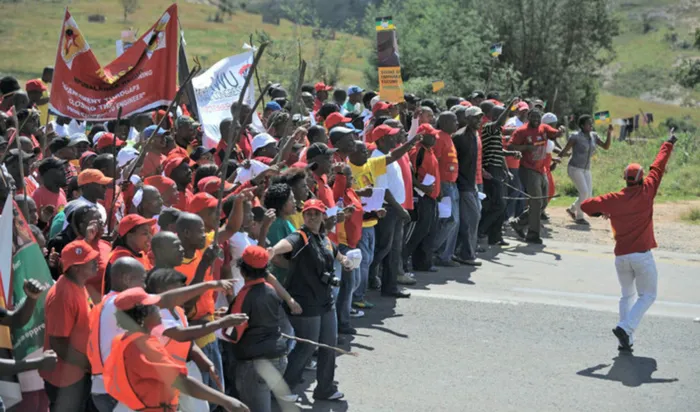Foreign policy conundrum

The columnist questions Deputy Minister of International Relations and Co-Operation Ebrahim Ebrahim's advice to Swazi democrats to rise against Swaziland's King Mswati III, which is in stark contrast to South Africa's guarded foreign policy towards despots such as Libyan leader Muammar Gaddafi and Zimbabwe's Robert Mugabe. In this April file picture, Cosatu members gathered at the Oshoek border post to show solidarity with the people of Swaziland. The columnist questions Deputy Minister of International Relations and Co-Operation Ebrahim Ebrahim's advice to Swazi democrats to rise against Swaziland's King Mswati III, which is in stark contrast to South Africa's guarded foreign policy towards despots such as Libyan leader Muammar Gaddafi and Zimbabwe's Robert Mugabe. In this April file picture, Cosatu members gathered at the Oshoek border post to show solidarity with the people of Swaziland.
Peter Fabricius
Was it just in an unguarded moment that Deputy Minister of International Relations and Co-operation Ebrahim Ebrahim advised Swazi democrats to “rise and take control of the situation”?
Or was he revealing some nuances of foreign policy hitherto not clearly detected?
Ebrahim was addressing the SA Institute of International Affairs on South Africa’s policy towards the Middle East and North Africa, where democrats have been rising up against autocratic leaders all year.
But he was also asked what South Africa intended to do about serious human rights violations and a severe democratic deficit closer to home, within southern Africa, including Zimbabwe, the Democratic Republic of Congo and Swaziland.
With particular reference to Swaziland, Ebrahim said: “We tell those people they must rise and take control of the situation. It’s your responsibility. We can’t liberate you.”
Although the ANC had eventually got lots of international support for its own liberation struggle, “we took our own initiative to liberate ourselves”, as many Arabs were now doing, he said.
These spontaneous remarks sounded very much like an exhortation to revolution and indeed, God forbid, to “regime change”, that supreme bogeyman of the government’s foreign policy.
This stood in sharp contrast to Ebrahim’s prepared speech, which was devoted to an apparently very different approach.
“Our overriding mantra when it comes to dealing with vexing international questions remains the same, and that is, political dialogue,” he insisted.
This was very much in the context of delivering some of the sharpest criticism so far by anyone in government of the Nato powers for continuing to bomb Libyan leader Muammar Gaddafi’s forces instead of supporting the AU’s demand for political dialogue to end the civil war.
South African officials have before privately criticised the democratic opposition in Zimbabwe for lacking the will, determination and/or courage to take its own destiny into its hands.
One suspects this sort of revolutionary advice – which comes with the important rider, as one again heard from Ebrahim, “we can’t liberate you” – may be just an excuse for South Africa to do nothing.
If not, why not give the same advice to Libyan democrats? Why does Pretoria not step back and let them rise up and overthrow Gaddafi on their own?
Or even, after Ebrahim’s analogy about the ANC, which he said rose up against apartheid and was then offered international support – why does South Africa not back military action to oust Gaddafi?
Why instead is it so energetically pursuing the AU’s Roadmap?
Is the answer that it is because the West is involved? Is it because the West, through Nato (though of course some Arab states like Qatar are also members of the military coalition backing the rebels) is taking the revolutionary approach, South Africa feels it must take the opposite approach, which is political dialogue?
Is this much more about “African solutions to African problems” than it is about any solution to Libya’s problems?
It is difficult to avoid the suspicion that South Africa’s Libyan position is essentially anti-Western.
And certainly its anti-Nato rhetoric is becoming ever more strident, as Ebrahim’s address made very clear.
He made it very clear that Pretoria is so mad with Nato over its bombing of Gaddafi’s forces that it will not support a Western-sponsored resolution condemning Syrian President Bashar al-Assad’s brutal crackdown on unarmed democratic protesters – no matter how it is worded.
Ebrahim said on Friday that South Africa “wants to send a very clear message, that we will not be taken for a ride again”, referring to Pretoria’s feeling that it was betrayed by Western powers into voting for UN Security Council Resolution 1973, which authorised military action against Gaddafi.
South Africa says it voted only for military action to protect civilians and not for military action to effect “regime change” by getting rid of Gaddafi.
Yet the Swazi democrats must apparently now rise up and topple King Mswati III? Go figure.